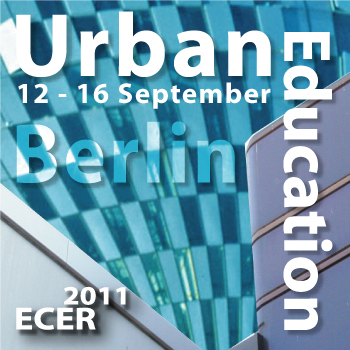Urban Education: views from two continents
Wednesday, 14/Sep/2011, 3:00pm - 4:30pm
KL 32/102
The symposium is sponsored by the World Educational Research Association (WERA), an association of national, regional, and international specialty research associations including EERA. WERA wants to advance education research as a scientific and scholarly field and undertakes initiatives that are global in nature and thus transcend what any one association can accomplish in its own country, region, or area of specialization.
The theme for the ECER conference among others says: “Cities have always been regarded as leading elements in Europe; they are modern, progressive and networked. They are producers and traders; they are medium for political and cultural development.” This WERA symposium broadens this European perspective on cities to include experiences from Mexico, Chile, Peru, Brasil and South Africa.
Chair: Lejf Moos, President EERA, Aarhus Universitet
Discussant: CHENG, Yin Cheong, Hong Kong Institute of Education, President-elect, World Educational Research Association
Urban Education in Latin America: some questions
Belmira Oliveira Bueno, University of São Paulo, Brazil
This work presents an overview about the urban education in Latin America. It first examines the definition of urban school, than, describes the development of public schools in the region and the efforts made by the countries for democratization of education. It is interrogated of both the social and political factors that lead to different problem posing and subsequent solutions within the countries. In this way, some themes and questions will be focused: the policy of the learning cycles in Brazil, the formal e non formal education for youngsters in Mexico, the Chilean educational reform and its changes, among others.
Capturing mobile lines of flight in the reconfiguring schooling landscape of the post apartheid city
Aslam Fataar, Department of Education Policy Studies, Stellenbosch University
The paper is based on the view that what people in South African ‘post-racial’ cities become can be understood by considering their daily interaction with the city’s schools. The ‘desire’ for quality schooling unlike the situation during the apartheid years is a key motivator of school choice. Mobility is central to contemporary school access. I focus on the interaction between ‘lived space’ and the subjectivities people take on as they navigate the city’s schools. I combine the work on grassroots globalization, and on the ‘post colony’, to suggest that urban educational practices, processes and subjectivities are the outcome of a complex of contingent dynamics articulated in the place of the city. Theoretically, I bring notions of ‘space’, ‘mobility’, and ‘self-formation’ into an analytical application and consideration of the subjectivities associated with schooling in post-apartheid cities. The school going subject’s mobility inflects the post-apartheid city, leading to a ‘city on the move’. South African cities are now cities on the move and on the make, made up of heterotopic spaces, where school-related citizenship is not cultivated in the place of students’ living environments, but in precarious extensions that they make daily across the city.
Public School in Metropolitan Lima. An institution in extinction?
Ricardo Cuenca, Senior Researcher of the Institute of Peruvian Studies, Lima, Peru
What is the future of public schools in Metropolitan Lima? Who are those who claim private basic education in Lima? What is the quality of private schools in Lima? Who would be in the future users of the public school in Lima? The study hypothesis is that the demand for public basic education services in Metropolitan Lima would be reduced to the most excluded families should remain a scenario in which the private supply growth increases, despite the quality of service provided, and the size of families is maintained. The main objective is to analyse the future position of public school in Metropolitan Lima, in the light of economic and demographic changes in the country.
